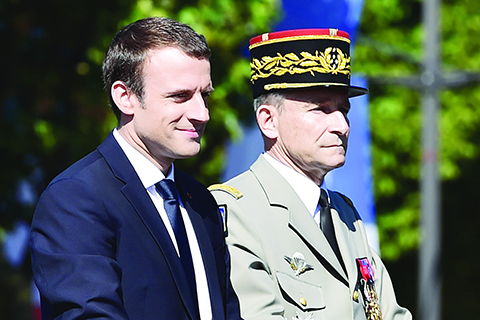
PARIS: This photo taken on July 14, 2017 shows French President Emmanuel Macron (left) and Chief of the Defense Staff, French Army General Pierre de Villiers, riding aboard a command car during the annual Bastille Day military parade on the Champs-Elysees avenue. - AFP
PARIS: France's top military chief resigned yesterday after a war of words with Emmanuel Macron over budget cuts that posed the biggest test yet of the new president's authority. The row between Macron and General Pierre de Villiers erupted last week when the chief of staff told a parliamentary committee he would not allow the armed forces to be "screwed" by the government's plans to slash 850 million euros ($980 million) from this year's budget.
Macron, 39, slapped down the 60-year-old five-star general in front of army chiefs at their annual summer party, saying "I am the boss" and that he deeply regretted the budget dispute had been dragged into the "public sphere". In a Sunday newspaper interview, Macron said that if there was a difference of opinion, "it is the chief of the defense staff who will change his position". De Villiers, who had been in the job for three years and was highly popular with the rank and file, said he had no choice but to stand down.
"I no longer feel able to ensure the sustainability of the model of the armed forces that I think is necessary to guarantee the protection of France and the French people," he said in a statement. General Francois Lecointre, 55, currently the top military adviser to the prime minister, was named as his replacement. At a weekly cabinet meeting Macron hailed de Villiers for his "remarkable service" and called Lecointre a "hero, who was recognized as such in the army" for his service in the Balkans. The president promised to hike the defense budget again in 2018.
Seen as one of the finest officers of his generation, de Villiers' departure met with howls of indignation from the opposition. The leader of the hard-left France Unbowed, Jean-Luc Melenchon, called it an "enormous mistake" on Macron's part. De Villiers' leaked remarks about the budget had been made behind closed doors to a committee that expected him to "respond frankly", Melenchon argued. Far-right leader Marine Le Pen, whom Macron beat in the presidential run-off, said the French military had lost "a man of huge value" and claimed de Villiers' resignation showed "the very serious abuses and worrying limits" of Macron's leadership.
De Villiers had repeatedly complained that the military was overstretched and said he saw it as his duty to inform politicians. In a Facebook "letter to a young recruit" last week, he wrote: "As everyone has their shortcomings, no-one should be blindly followed."
The opposition accused Macron of humiliating his military chief but Prime Minister Edouard Philippe told parliament yesterday de Villiers could not, as a soldier, "honorably contest his boss's choices". Retired General Dominique Trinquand, who advised Macron during his campaign, said the row had cast a pall over his otherwise "remarkable" start in office. "This is a hitch that will probably be a bit difficult to get past," he said in an interview with AFP.
Macron's defense cuts - part of a 4.5-billion-euro reduction in spending aimed at reducing France's budget deficit - have been viewed by the military as a betrayal after his strong show of support for the armed forces. On his first day as president, he visited soldiers injured in overseas operations and his maiden foreign trip as leader took him to Mali to meet French troops engaged in counter-terrorism operations.
A former head of the French air force, General Vincent Lanata, told L'Express news weekly on Tuesday he was "very shocked" by Macron's "rant" at de Villiers. The crisis was exacerbated by its timing, coming in the week of the July 14 Bastille Day military parade, where US President Donald Trump was the guest of honor. During the parade, Macron rode down the Champs-Elysees avenue in an open-topped military vehicle with a grim-faced de Villiers as Trump looked on.
Macron says the belt-tightening is temporary and that he remains committed to boosting defence spending to 2.0 percent of gross domestic product by 2025 (around 50 billion euros), in line with NATO targets. Nuclear-armed France and Britain are the biggest military powers in the European Union.
French forces are currently engaged on three fronts. French jets are taking part in strikes against Islamic State jihadists in Syria and Iraq. Some 4,000 French soldiers are involved in efforts to stop the spread of extremism in West Africa. And at home, 7,000 soldiers are deployed to patrol the streets after a series of terror attacks that have killed more than 230 people since 2015. - AFP









